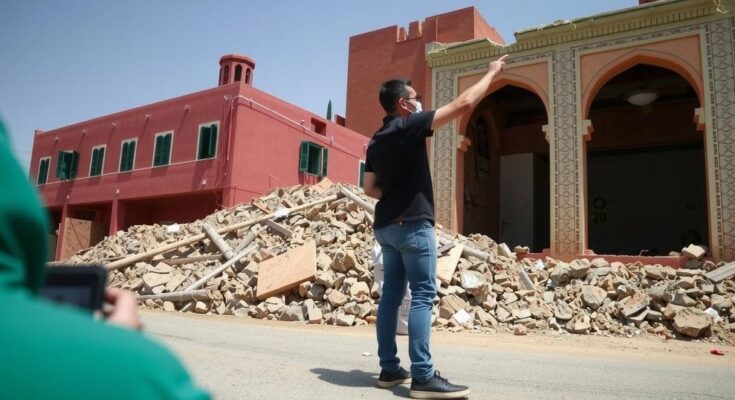Four activists, including Said Ait Mahdi, appear in court facing defamation charges linked to their earthquake response critiques. The 2023 earthquake in Morocco resulted in significant destruction and loss. Civil advocacy for victims is met with legal challenges, raising concerns over government accountability and support for affected families.
On Monday, four activists representing victims of the devastating 2023 earthquake in Morocco were brought before a court in Marrakech, facing defamation charges, as reported by their lawyer. Said Ait Mahdi, leader of the Al Haouz Earthquake Victims Coordination, remains in custody for allegedly defaming local officials through social media. In contrast, the three other activists, accused of insulting public officials, have not been detained. Their lawyer, Mohamed Nouini, indicated that the charges stemmed from complaints lodged by local officials regarding the activists’ critical posts online.
The September earthquake, which measured 6.8 in magnitude, severely impacted the Al Haouz province, leading to nearly 3,000 fatalities and countless injuries, as well as widespread destruction of homes. Many affected families are currently enduring harsh winter conditions after losing their residences. Ait Mahdi’s organization is advocating for expedited reconstruction efforts and increased assistance for those impacted.
As of December, Moroccan authorities reported that approximately 57,000 reconstruction permits had been issued, with over 35,000 homes either completed or already under construction. The government has announced a comprehensive five-year reconstruction strategy, supported by a budget of $11.7 billion, which allocates roughly $740 million specifically to aid families in rebuilding their homes. These funds are intended to be distributed in multiple instalments, ensuring that assistance reaches those in need effectively.
The socio-political climate in Morocco has been notably strained in the aftermath of the September 2023 earthquake, one of the most catastrophic in recent history. Al Haouz province, close to Marrakech, suffered the brunt of the disaster, prompting rising tensions as activists seek accountability and better support for affected populations. The legal actions against these activists often reflect broader conflicts between civil society and governmental authorities, particularly regarding public dissent and criticism in sensitive contexts such as disaster responses. The urgent need for reconstruction and humane treatment of affected families underscores the importance of advocacy in these troubling times, further complicating the relationship between state institutions and citizen organizations.
The case of the four activists highlights the ongoing struggle for accountability and justice in the aftermath of the devastating 2023 earthquake in Morocco. As the government rolls out its ambitious reconstruction plans, the tensions between local officials and advocates for the victims underscore the critical need for transparent and responsive governance. The activists’ commitment to supporting earthquake victims illustrates the vital role of civil society in challenging narratives and demanding action, amidst a challenging political landscape.
Original Source: www.arabnews.com




